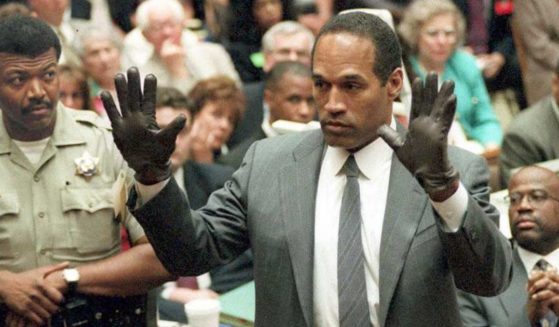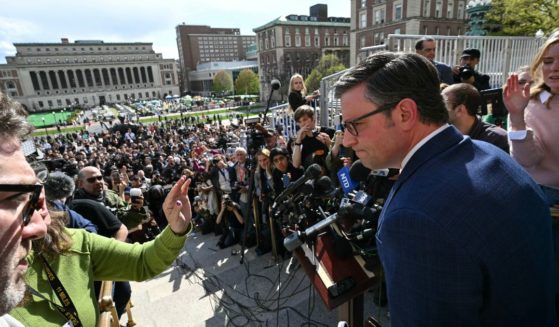I Read the Book Target Banned That's Critical of Transgenderism in Girls - It's Essential Reading for This Day and Age
“Irreversible Damage” by Abigail Shrier made headlines when Target, responding to a tweet from a disgruntled reader, took the book off its shelves briefly in the fall.
“I think the trans community deserves a response from @AskTarget @Target as to why they are selling this book about the “transgender epidemic sweeping the country,” the user tweeted on Nov. 11, ending with the words “Trigger Warning: Transphobia” on a separate line.
“Thank you so much for bringing this to our attention. We have removed this book from our assortment,” Target responded on Nov. 12.
The author tweeted her confusion and hurt over the situation on the same day:
“Target.com just made my book disappear. Does it bother anyone that Woke activists and spineless corporations now determine what Americans are allowed to read?”
On Nov. 13, after Target’s action produced outrage, the retail company put the book back on its physical and online shelves, tweeting, “Yesterday, we removed a book from Target.com based on feedback we received. We want to offer a broad assortment for our guests and are adding this book back to Target.com. We apologize for any confusion.”
The publisher, Regnery Publishing, which recently signed Republican U.S. Sen. Josh Hawley of Missouri after Simon & Schuster canceled his book deal, was kind enough to send me “Irreversible Damage” in exchange for what they termed “an honest review.”
Upon a careful look at the cover, it’s easy to see why many people would jump to the conclusion that Shrier’s book is anti-transgender. As we all tend to do in real life and at first glance, we judge the book by its cover, make our comments — mostly in a Twitter thread form — without researching or even opening the book.
This is how Shrier’s book became banned from Target’s shelves for a brief period. All it took was one person seeing it and tweeting about it for Target to remove it completely.
From the introduction, however, it’s clear that the author is not transphobic at all. She simply is concerned with the increased rates of girls who want to transition in what she calls an “unprecedented” fashion.
“Between 2016 and 2017 the number of gender surgeries for natal females in the U.S quadrupled, with biological women suddenly accounting for — as we have seen — 70 percent of all gender surgeries. In 2018, the UK reported a 4,400 percent rise over the previous decade in teenage girls seeking gender treatments,” Shrier says in Chapter 1.
She doesn’t write off gender dysphoria. She seeks in the book to show that this sudden spike in girls looking to change genders isn’t something to ignore and potentially can be attributed to the effects of social media and the loneliness that sweeps the current generation.
The idea for the book came when Shrier wrote an Op-Ed for The Wall Street Journal titled “The Transgender Language War.” It was based on the law that former California Gov. Jerry Brown, a Democrat, signed that threatened jail time to health care workers who refused to use patients’ preferred pronouns.
Shrier wrote, “Compelled speech is no less unconstitutional for those who refuse an utterance based on a different viewpoint, as the Supreme Court held in West Virginia State Board of Education v. Barnette (1943).
“Upholding students’ right to refuse to salute an American flag even on non-religious grounds, Justice Robert H. Jackson declared: ‘If there is any fixed star in our constitutional constellation, it is that no official, high or petty, can prescribe what shall be orthodox in politics, religion or other matters of opinion or force citizens to confess by word or act their faith herein.
“This is precisely what forced reference to someone else as ‘ze,’ ‘sie,’ ‘hir,’ ‘co,’ ‘ev,’ ‘xe,’ ‘thon’ or ‘they’ entails. When the state employs coercive power to compel an utterance, what might otherwise be a courtesy quickly becomes a plank walk.”
This led to a woman writing to Shrier about her daughter and how she was concerned about her since she had “never shown any signs of gender dysphoria in her youth” yet was claiming she wanted to be a man.
Her mother added that the internet had helped her daughter discover this new identity — something that many parents interviewed by Shrier echoed.
Thus, the book “Irreversible Damage” was born and published this past June. After Shrier conducted over 200 interviews and spoke to more than four dozen families of adolescents, a picture of familiarity started to form and a narrative was presented.
Could increased access to technology and increased loneliness among adolescents be contributing to this influx of transgender girls?
Throughout the book, the author paints a picture of parents being undermined, children being their own doctors, and health care professionals being all too eager to prescribe medicine to “transition” kids.
From the information presented to the diction that Shrier uses, there is no doubt she researched her subject with care and did due diligence to get all sides of the story.
From reaching out to those who opposed her Op-Ed piece, she encouraged conversation so she could hear the other side of the story. She spoke to Trans activists and influencers, psychologists, doctors and many more.
This isn’t a transphobic book, but instead a concern for the popular trend that seems to be sweeping young women, along with how society’s reaction to it can be more harmful than helpful.
It made me think about what influenced me when I was an adolescent and how I fixated my identity on things based on what I was exposed to and how most of the time, I moved on to new interests until I was able to form my own fully realized identity at age 22.
Despite having social media, I grew up in an in-between generation that had both traditional childhoods and teen years surrounded by phones and technology.
As the generation below me chases after new inventions and shiny toys, it’s an important conversation to have and to remember that technology can have an astronomical impact.
It’s also dangerous to try to silence anyone who disagrees with how to approach gender dysphoria. Not only for us but for the adolescent girls who just want to find where they belong. Not everything is clear-cut, and science is always expanding and improving.
Shrier shows how we need to do more than just write off this trend with medication, hormone therapy and surgery, as suggested by many officials she spoke to. That isn’t the answer. We need to look at all aspects of a patient, such as medical history, therapy, feelings of belonging and where they feel their place in life is before we jump to medication and hormone therapy.
As Shrier writes, “This is a story Americans need to hear. Whether or not you have an adolescent daughter, whether or not your child has fallen for this transgender craze, America has become fertile ground for this mass enthusiasm for reasons that have everything to do with our cultural fragility: parents are undermined; experts are over-relied upon; dissenters in science and medicine are intimidated; free speech truckles under renewed attack; government healthcare laws harbor hidden consequences; and an intersectional era has arisen in which the desire to escape a dominant identity encourages individuals to take cover in victim groups.”
This book sparks a conversation we all need to have and hear. It might be uncomfortable, but it’s necessary for future generations.
Truth and Accuracy
We are committed to truth and accuracy in all of our journalism. Read our editorial standards.












